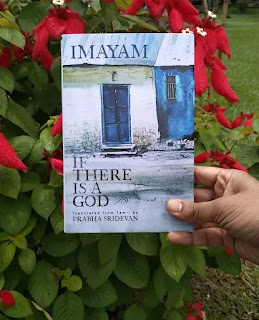If There is a God is a collection of ten
stories by Imayam where the sharp portrayal of reality makes one wonders if
this is a work of fiction. Commonplace scenarios, emotions and challenges flood
the pages making every story dazzle with relatability.
Women form the backbone of these stories. They clearly understand the driving forces of society and are resilient. Some are highly pragmatic and some extremely sentimental but they all fight their circumstances valiantly irrespective of whether they win or succumb. It's noteworthy that Imayam chooses names for his women characters with care. When most women stay away from graveyards in fear of being possessed by evil spirits, 'No Fear in the Burial Ground' portrays a woman who digs graves without fear for the rich and poor, for the revered and orphaned ones. Imayam names her 'Sita', one who welcomes the dead onto the lap of 'Bhoomadevi', her mother. Likewise, 'Kannagi' rages against injustice in the titular story.
The character Selvakumar from the story ‘Santha’ mutters in frustration ‘Females are the same everywhere’ and Imayam leaves no stone unturned to point out that their predicament and plight is also the same everywhere. If the opening story (Over in a Moment) playfully introspects how a couple’s sexual intimacy changes over years after marriage, the longest story (The Dubai Man’s Wife) on a married woman’s infidelity raises the question ‘life or honour, which is more important’ vociferously.
Men, too share their woes here - a peon yearns for little self respect at his workplace in ‘Saar’ and an old man laments the loss of his birthplace, his ancestral home in ‘The Maniyakarar House’.
Caste is an important marker in these stories with focus not only on top-down oppression but on how power & money changes equations even within the same rung. Contemporary and important issues like how COVID-19 killed not only humans but humanity, the ubiquitous ‘cash for votes’ during elections and child sexual abuse appear in stories here.
The translation by Prabha Sridevan that offers a glitch-free reading experience was intimate enough to let me map in my head the probable lines in original, in rural Tamil argot.
“If there was no stomach and no hunger, man would not need to suffer any indignity”.
“Are courts and the police meant only for
those who have money?”
Imayam’s stories, layered with crucial
questions/observations, emphasize the need for moral integrity and empathy; two
qualities that humans conveniently lack, the dearth of which often makes him
utter ‘If there is a God’.
A ‘true to life’ collection of stories, a fine place to start reading the author.
Additional Titbits:
Imayam (pen name of V Annamalai), a school
teacher and writer, received the Sahitya Akademi award in the year 2020 for his
work Sellada Panam. He rejects labels like feminist writer, Dalit writer and
vehemently asserts that his works be known and judged for their literary merit.
During the book launch, the translator Prabha Sridevan explains how translation into English is never an easy task and leaves gaps in conveying emotions taking a simple instance - vandhaar and vandhaan, the two Tamil words translate into ‘he came’ in English but the former clearly indicates respect and the latter lacks it. She has also translated R Chudamani’s Echoes of Veena and other stories and Meeran’s Stories, both published by Ratna Books.
The beautiful cover design is done by Anshul Milan.



